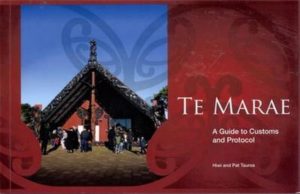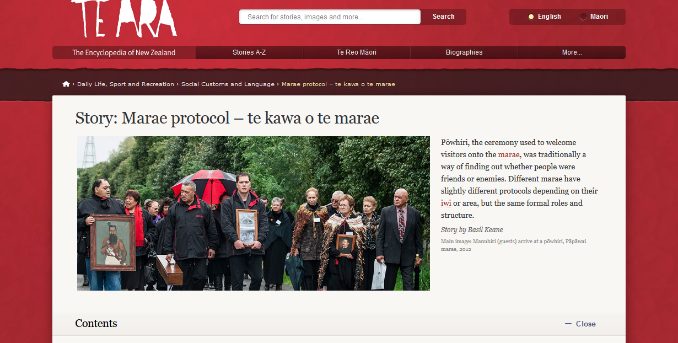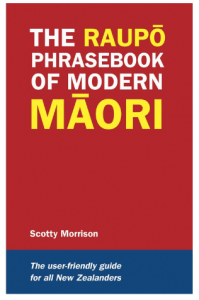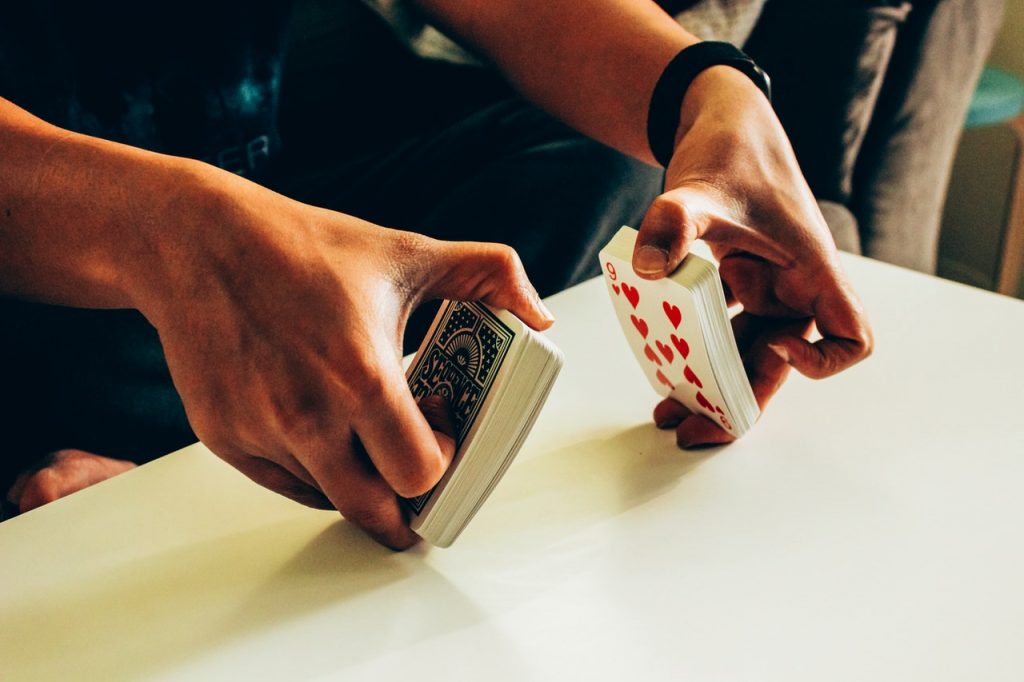Poroporoaki
Further resources
The Department of Corrections has produced a very good app (Apple and Android friendly) called Tihi-o-Manōno which is freely available to the public. What is really good about it is the way it says the word you touch so proper pronounciation is protected. It covers quite a bit of information too incidentally.
There are a host of books and YouTube videos which are recommended for further reading and watching, in addition to those embeded in this learning module.
 Te Marae is a very readable guide by Hiwi and Pat Tauroa is widely available at online book stores and it may even been found on the shelves of your local book retailer.
Te Marae is a very readable guide by Hiwi and Pat Tauroa is widely available at online book stores and it may even been found on the shelves of your local book retailer.
The web contains a number of publications, guide sheets and videos on Marae protocols. It is recommended that learners direct their attention to more authoritive accounts of how to conduct themselves in such situations. For a good place to start the following recommendation may be adopted:

 Scotty Morrison (Ngāti Whakaue ki Rotorua) has written a few books to guide process of learning Māori and the phrasebook in concert with ‘Māori made Easy’ workbooks are recommended for those whose experience of te Ao Māori becomes the spur to learn and know more.
Scotty Morrison (Ngāti Whakaue ki Rotorua) has written a few books to guide process of learning Māori and the phrasebook in concert with ‘Māori made Easy’ workbooks are recommended for those whose experience of te Ao Māori becomes the spur to learn and know more.
There is nothing like the real-life experience with support by real-life mentors however – and access to it ongoingly.
Farewell
This is an important and integral piece of learning for people working at Victim Support as we embark on honouring our partnership obligations to the Treaty of Waitangi and in that process, learning how to engage with Māori in a sensitive and appropriate manner.
Quite apart from that it is an interesting and exhilarating journey of discovery which I commend to everyone.
In the preparation of this online learning module it is important to acknowledge the current work being done by our Kaumātua, Rāwiri Wharemate and his daughter, Laurie Keung.
This learning module is merely a beginning and if it has served its purpose, it will merely be the ‘welcome mat’ to further learning which learners will engage by working with Māori people, resources recommended by them, media, and practice.
The information provided here is a synthesis of many discussions, reading and media such as YouTube and Ted Talks.
There are many players in this space, directly and indirectly involved who deserve acknowledgment but they would neither seek this out nor bask in the accolades. They have been the prime movers in the workspace for te reo me ōna tikanga. Tēnā koutou katoa.
Tīra nā kāte
It reminds me of an experience I had in Murupara with many whanaunga around the table where we were playing six-handed poker. Always inquisitive I asked our cousin “what is the Māori expression for playing cards?” he replied “tīra nā kāte”.
A few moments later I asked him “What is the Māori expression for shuffling cards?” he looked at me and sighed, then responded “tīra nā kāte”.
Perplexed I countered “what then is the Māori expression for dealing the cards?” ‘Tīra’ sounded awfully like ‘deal’ to me.
He looked at me purposefully and laid his cards on the table. “You Pākehā get caught up in words for this and words for that; just play cards – tīra nā kāte!”
In that moment I understood clearly that sometimes no words are needed at all and the overarching expression ‘tīra nā kāte’ was the only thing that needed to be said – and then only once at the outset.
Sometimes the richness of an experience is lost in an attempt at explanation; especially when translation into English is required.
Embarking on the journey to learn te reo Māori me ōna tikanga is probably more about the experiences than the words. Not understanding why things are done in a particular way in a Māori setting will likely trigger the discovery muscle. It is also worth noting that sometimes, words will just get in the way of things.
– Grant Daly, Learning & Development Manager, Victim Support New Zealand


